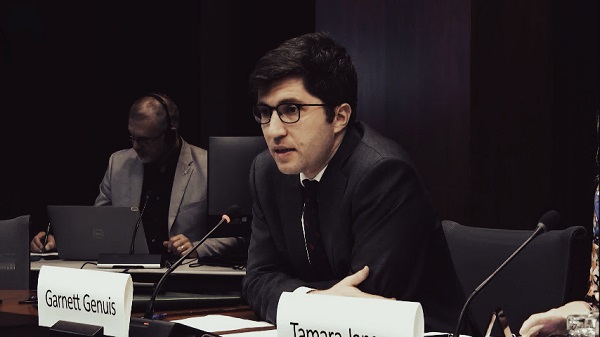Alberta
Honouring Canada’s Military History – Veteran’s Week

“November 5-11 is Veteran’s Week, honoring those who have served Canada, past and present, in times of war, military conflict, and peace.”
 Veteran’s Week is dedicated to promoting the education and understanding of Canadian military history, and preserving and honoring the memory of those men and women who dedicated themselves to protecting and fostering freedom and peace. This year, Veteran’s Week recognizes the 75th anniversary of the end of the Second World War, where more than one million Canadians served in the military and countless more on the home front, supplementing industry and agricultural efforts for the war.
Veteran’s Week is dedicated to promoting the education and understanding of Canadian military history, and preserving and honoring the memory of those men and women who dedicated themselves to protecting and fostering freedom and peace. This year, Veteran’s Week recognizes the 75th anniversary of the end of the Second World War, where more than one million Canadians served in the military and countless more on the home front, supplementing industry and agricultural efforts for the war.
“Veterans Affairs Canada encourages all Canadians to learn more about the sacrifices and achievements made by those who served our country, and to help preserve their legacy by passing the torch of Remembrance to future generations of Canadians.”
Veteran’s Week is a reminder to those of us who have experienced the violence and devastation of war only through textbooks or television to never take for granted the rights, freedoms and institutions we access on a daily basis in Canada. The men and women who selflessly stepped up to serve their country were mothers, fathers, sons, daughters, friends and loved ones whose lives would be forever changed by their service. Those who survived face lifelong battles of physical and mental trauma, and those who were lost, many of them young soldiers, would never return to enjoy the peace and liberty they had sacrificed everything to defend.
Every year, Veterans Affairs Canada encourages public engagement and participation in Veteran’s Week by sharing the stories of those who served, hosting public events and remembrance ceremonies, and commissioning commemorative Veteran’s Week posters.
“Veterans want Canadians to understand the price of freedom.” (1)
 One of this year’s Veteran’s Week posters features the story of retired Sergeant Norman Harold Kirby, who enlisted to serve in the Second World War in 1943 at just 17 years old. During his time as a soldier, he stormed Juno Beach on June 6, 1944 as a part of the D-Day assault, served in the Battle of Normandy, and fought in France, Belgium, Germany and the Netherlands. He was discharged in September of 1945 having led a distinguished military career, and was eventually awarded the Field-Marshal Montgomery Award for Gallantry and the Ordre National de la Légion d’honneur and a knighthood from the French Republic.
One of this year’s Veteran’s Week posters features the story of retired Sergeant Norman Harold Kirby, who enlisted to serve in the Second World War in 1943 at just 17 years old. During his time as a soldier, he stormed Juno Beach on June 6, 1944 as a part of the D-Day assault, served in the Battle of Normandy, and fought in France, Belgium, Germany and the Netherlands. He was discharged in September of 1945 having led a distinguished military career, and was eventually awarded the Field-Marshal Montgomery Award for Gallantry and the Ordre National de la Légion d’honneur and a knighthood from the French Republic.
After his discharge in 1945 he returned to his home in North Vancouver, still very much a young man. “I was only 19 years old when I got home,” he says, “not even old enough to vote or have a beer with my father” (2).
 The second 2020 Veteran’s Week poster features the retired, married veterans Corporal Anne McNamara and Flying Officer Howard McNamara.
The second 2020 Veteran’s Week poster features the retired, married veterans Corporal Anne McNamara and Flying Officer Howard McNamara.
Howard enlisted in December 1941 and graduated senior flying training in Windsor Mills, Quebec, with his younger brother. He flew in the North African Campaign in 1942, after which he transferred from Egypt to serve in the Italian Campaign. He retired in March of 1945 at the plea of his remaining family, after learning of the death of his younger brother, who had been shot down while flying over Europe.
Anne joined the Royal Canadian Air Force in 1943 as a member of the Entertainment Unit, a traveling show of 30 or so people who performed on the Allied bases almost every night to keep spirits and morale among soldiers high. Anne traveled across North America and to Great Britain with the Entertainment Unit, where she witnessed the severe damage done by German bombing raids and experienced the fear of the air raid sirens herself. She retired in March of 1946 following the end of the war, after which she met her future husband Howard. The two were married in May of 1948, and currently reside in St. Laurent, Quebec (3).
“Remembering and reflecting on the significance of the contribution they made, and continue to make, strengthens the commitment to preserve the values that they fought and died for – truth, justice, peace, freedom and knowledge.” (4)
These stories offer just a glance into the lived experiences of thousands of Canadian veterans who aided military and industry efforts during some of the darkest times in our national and global history. This Veteran’s Week, explore opportunities to engage with Canadian military history at the local and national levels, and pay respect to our Canadian veterans and active service members as we approach Remembrance Day on November 11.
For more information on Veteran’s Week, visit https://www.veterans.gc.ca/eng/remembrance/get-involved/veterans-week.
Alberta
B.C. would benefit from new pipeline but bad policy stands in the way

From the Fraser Institute
By Julio Mejía and Elmira Aliakbari
Bill C-69 (a.k.a. the “no pipelines act”) has added massive uncertainty to the project approval process, requiring proponents to meet vague criteria that go far beyond any sensible environmental concerns—for example, assessing any project’s impact on the “intersection of sex and gender with other identity factors.”
In case you haven’t heard, the Alberta government plans to submit a proposal to the federal government to build an oil pipeline from Alberta to British Columbia’s north coast.
But B.C. Premier Eby dismissed the idea, calling it a project imported from U.S. politics and pursued “at the expense of British Columbia and Canada’s economy.” He’s simply wrong. A new pipeline wouldn’t come at the expense of B.C. or Canada’s economy—it would strengthen both. In fact, particularly during the age of Trump, provinces should seek greater cooperation and avoid erecting policy barriers that discourage private investment and restrict trade and market access.
The United States remains the main destination for Canada’s leading exports, oil and natural gas. In 2024, nearly 96 per cent of oil exports and virtually all natural gas exports went to our southern neighbour. In light of President Trump’s tariffs on Canadian energy and other goods, it’s long past time to diversify our trade and find new export markets.
Given that most of Canada’s oil and gas is landlocked in the Prairies, pipelines to coastal terminals are the only realistic way to reach overseas markets. After the completion of the Trans Mountain Pipeline Expansion (TMX) project in May 2024, which transports crude oil from Alberta to B.C. and opened access to Asian markets, exports to non-U.S. destinations increased by almost 60 per cent. This new global reach strengthens Canada’s leverage in trade negotiations with Washington, as it enables Canada to sell its energy to markets beyond the U.S.
Yet trade is just one piece of the broader economic impact. In its first year of operation, the TMX expansion generated $13.6 billion in additional revenue for the economy, including $2.0 billion in extra tax revenues for the federal government. By 2043, TMX operations will contribute a projected $9.2 billion to Canada’s economic output, $3.7 billion in wages, and support the equivalent of more than 36,000 fulltime jobs. And B.C. stands to gain the most, with $4.3 billion added to its economic output, nearly $1 billion in wages, and close to 9,000 new jobs. With all due respect to Premier Eby, this is good news for B.C. workers and the provincial economy.
In contrast, cancelling pipelines has come at a real cost to B.C. and Canada’s economy. When the Trudeau government scrapped the already-approved Northern Gateway project, Canada lost an opportunity to increase the volume of oil transported from Alberta to B.C. and diversify its trading partners. Meanwhile, according to the Canadian Energy Centre, B.C. lost out on nearly 8,000 jobs a year (or 224,344 jobs in 29 years) and more than $11 billion in provincial revenues from 2019 to 2048 (inflation-adjusted).
Now, with the TMX set to reach full capacity by 2027/28, and Premier Eby opposing Alberta’s pipeline proposal, Canada may miss its chance to export more to global markets amid rising oil demand. And Canadians recognize this opportunity—a recent poll shows that a majority of Canadians (including 56 per cent of British Columbians) support a new oil pipeline from Alberta to B.C.
But, as others have asked, if the economic case is so strong, why has no private company stepped up to build or finance a new pipeline?
Two words—bad policy.
At the federal level, Bill C-48 effectively bans large oil tankers from loading or unloading at ports along B.C.’s northern coast, undermining the case for any new private-sector pipeline. Meanwhile, Bill C-69 (a.k.a. the “no pipelines act”) has added massive uncertainty to the project approval process, requiring proponents to meet vague criteria that go far beyond any sensible environmental concerns—for example, assessing any project’s impact on the “intersection of sex and gender with other identity factors.” And the federal cap on greenhouse gas (GHG) emissions exclusively for the oil and gas sector will inevitably force a reduction in oil and gas production, again making energy projects including pipelines less attractive to investors.
Clearly, policymakers in Canada should help diversify trade, boost economic growth and promote widespread prosperity in B.C., Alberta and beyond. To achieve this goal, they should put politics aside, focus of the benefits to their constituents, and craft regulations that more thoughtfully balance environmental concerns with the need for investment and economic growth.
Alberta
Alberta introduces bill allowing province to reject international agreements

From LifeSiteNews
Under the proposed law, international treaties or accords signed by the federal government would not apply in Alberta unless approved through its own legislation.
Alberta’s Conservative government introduced a new law to protect “constitutional rights” that would allow it to essentially ignore International Agreements, including those by the World Health Organization (WHO), signed by the federal Liberal government.
The new law, Bill 1, titled International Agreements Act and introduced Thursday, according to the government, “draws a clear line: international agreements that touch on provincial areas of jurisdiction must be debated and passed into law in Alberta.”
Should the law pass, which is all but certain as Alberta Premier Danielle Smith’s Conservatives hold a majority government, it would mean that any international treaties or accords signed by the federal government would not apply in Alberta unless approved through its own legislation.
“As we return to the legislature, our government is focused on delivering on the mandate Albertans gave us in 2023 to stand up for this province, protect our freedoms and chart our path forward,” Smith said.
“We will defend our constitutional rights, protect our province’s interests and make sure decisions that affect Albertans are made by Albertans. The federal government stands at a crossroads. Work with us, and we’ll get things done. Overstep, and Alberta will stand its ground.”
According to the Alberta government, while the feds have the “power to enter into international agreements on behalf of Canada,” it “does not” have the “legal authority to impose its terms on provinces.”
“The International Agreements Act reinforces that principle, ensuring Alberta is not bound by obligations negotiated in Ottawa that do not align with provincial priorities,” the province said.
The new Alberta law is not without precedent. In 2000, the province of Quebec passed a similar law, allowing it to ignore international agreements unless approved by local legislators.
The Smith government did not say which current federal agreements it would ignore, but in theory, it could apply to any agreement Canada has signed with the United Nations or the WHO.
-

 Health2 days ago
Health2 days agoFor Anyone Planning on Getting or Mandating Others to Get an Influenza Vaccine (Flu Shot)
-

 Business2 days ago
Business2 days agoLiberals backtrack on bill banning large cash gifts, allowing police to search Canadians’ mail
-

 Sports2 days ago
Sports2 days ago‘We Follow The Money’: Kash Patel Says Alleged NBA Ties To Mafia Just ‘The Start’ Of FBI Investigation
-

 Alberta2 days ago
Alberta2 days agoPremier Smith moves to protect Alberta in International Agreements
-

 Business1 day ago
Business1 day ago‘TERMINATED’: Trump Ends Trade Talks With Canada Over Premier Ford’s Ronald Reagan Ad Against Tariffs
-

 Business2 days ago
Business2 days agoA Middle Finger to Carney’s Elbows Up
-

 Business15 hours ago
Business15 hours agoTrump Admin Establishing Council To Make Buildings Beautiful Again
-

 Alberta6 hours ago
Alberta6 hours agoB.C. would benefit from new pipeline but bad policy stands in the way



